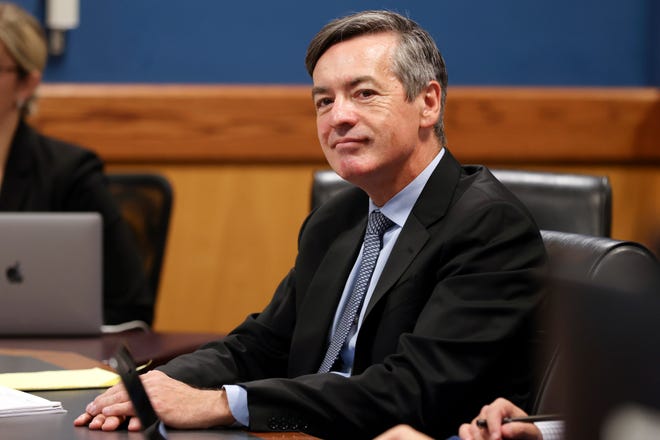Fake elector plotter Kenneth Chesebro is reported to be cooperating with a Wisconsin investigation
 Molly Beck
Molly Beck
MADISON – An attorney who helped design a plot to create slates of false electors for former President Donald Trump in 2020 is cooperating with Wisconsin investigators, according to a new report.
Kenneth Chesebro, a Wisconsin native and former campaign attorney for Trump, is now helping investigators in at least four states who are probing the scheme to overturn the 2020 election, CNN reported Friday citing unnamed sources.
Wisconsin Attorney General Josh Kaul has not previously disclosed whether state Department of Justice officials are investigating the scheme involving 10 Wisconsin Republicans who met in state Capitol on Dec. 14, 2020 to sign paperwork falsely claiming to be electors for Trump.
The group met after Trump's election loss had been confirmed by Trump-financed recounts and lawsuits.
Biden beat Trump by about 21,000 votes in Wisconsin. Trump sought recounts in Dane and Milwaukee counties, which confirmed Biden's win. Trump sued and the state Supreme Court upheld the results on a 4-3 vote on Dec. 14, 2020 — the same day the group of Republicans met to sign the paperwork falsely claiming to be electors.
In a statement, Department of Justice spokeswoman Gillian Drummond said the state DOJ "generally does not confirm or deny the existence of an investigation, except in unique public safety circumstances."
"Attorney General Kaul strongly believes that those who committed crimes in an effort to unlawfully subvert the outcome of an election should be held accountable," she said.
The group of Wisconsin Trump electors on Wednesday settled a civil lawsuit filed against them by electors for President Joe Biden. As part of the settlement, the 10 Republicans issued a statement acknowledging their actions were used to try to overturn an election, agreed not to be electors for Trump in the future, and did not admit guilt.
The lawsuit also named Chesebro and Wisconsin attorney Jim Troupis as defendants, who are still scheduled to stand trial in September. Troupis represented the Trump campaign in 2020.
At the time, the fake Trump electors said they held the meeting to ensure the state's electoral votes were cast for Trump if a court later determined he was the true winner of the state.
The plan was spelled out by Chesebro in a memo dated Nov. 18, 2020 — the same day Trump asked for recounts in Dane and Milwaukee counties.
More:Here are the ways Ron Johnson, others with Wisconsin ties appear in the Trump Jan. 6 indictment
Chesebro sent the memo to Troupis, the attorney who oversaw Trump's post-election legal strategy in Wisconsin and is also a defendant. It's unclear whether Chesebro worked for Trump or someone else. Chesebro sent a second memo on the matter on Dec. 9, 2020, after state officials certified Biden as the victor in Wisconsin.

The filings from the fake electors in Wisconsin and elsewhere were used by Trump and his allies to argue the results were in dispute as they tried to prevent Congress from finalizing them.
Republicans in Arizona, Georgia, Michigan and Nevada also signed documents purporting to be electors. Republicans in New Mexico and Pennsylvania filled out paperwork saying they should be considered electors if courts found Trump had won their states.
Michigan’s attorney general filed felony charges in July against 16 Republicans there who acted as fake electors for Trump, accusing them of submitting false certificates that confirmed they were legitimate electors despite Joe Biden’s victory in the state.
Trump has been indicted over his actions leading up to the Jan. 6, 2021 insurrection − charges that focus heavily on the fake elector strategy.
Charges also have been filed against Republicans who posed as electors in Georgia, Michigan and Nevada. CNN reported Wednesday Chesebro has entered into agreements in several states that give him some protection from prosecution. Chesebro pleaded guilty in Georgia to conspiracy to commit filing false documents.
Molly Beck can be reached at molly.beck@jrn.com.